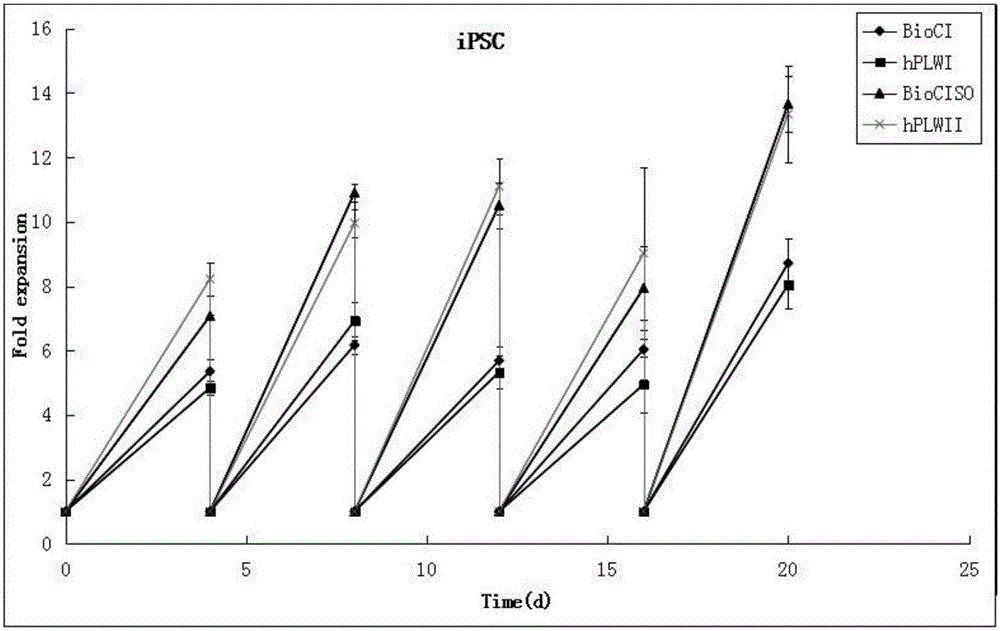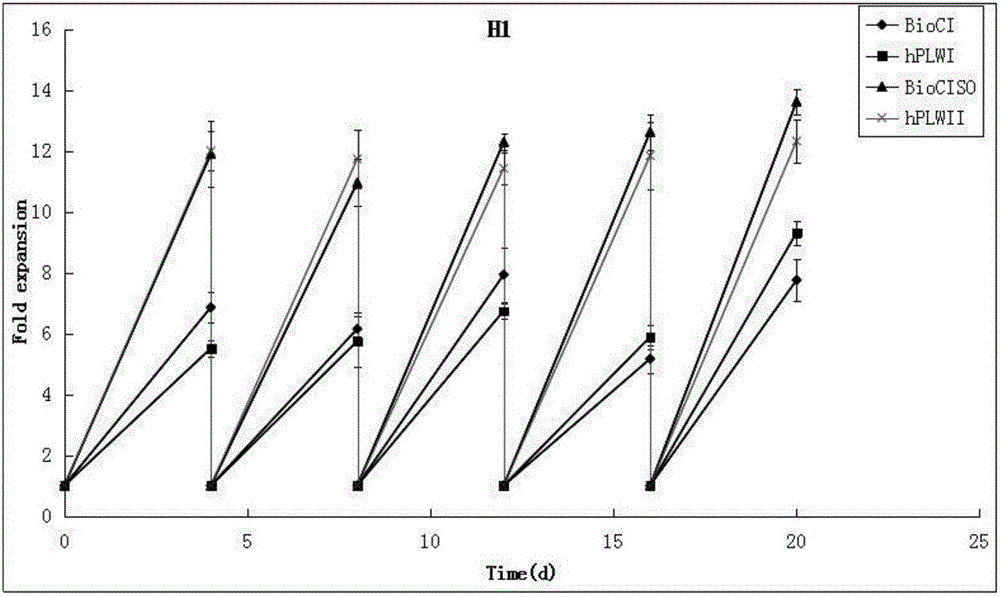Multi-potent stem cell culture medium
A pluripotent stem cell and culture medium technology, applied in the field of pluripotent stem cell culture medium, can solve the problems of high price, limited scientific research, and high cost, and achieve the effects of reducing production costs, reducing the risk of disease, and ensuring normal proliferation
- Summary
- Abstract
- Description
- Claims
- Application Information
AI Technical Summary
Problems solved by technology
Method used
Image
Examples
Embodiment 1
[0059] A kind of pluripotent stem cell culture medium, this culture comprises basal medium and following added components: L-ascorbic acid-2 phosphate magnesium, sodium selenite, human insulin, ferric citrate, basic fibroblast growth factor (abbreviated bFGF ) and transforming growth factor beta1 (abbreviated as TGF-β1), the distribution ratio range of medium components is shown in the table below;
[0060] Table 3 The components and contents of the medium in the examples
[0061] components
Dosage range
Magnesium L-ascorbic acid-2 phosphate (ug / mL)
64
Sodium selenite (ng / mL)
13.6
Human insulin (ug / mL)
20
Ferric citrate (ng / mL)
40
Basic fibroblast growth factor (ng / mL)
20
Transforming growth factor beta1(ng / mL)
0.5
Sodium chloride (adjust osmotic pressure mosmol / L)
280~350
DMEM / F12 medium
Make up to 1L
[0062] The specific experimental operation of MTT detection is as follows:...
Embodiment 2
[0076] In this example, experiments were carried out using BioCI medium and hPLWI medium to compare the effect of ferric citrate on cell proliferation.
[0077] In this example, 1 copy of BioCI medium, 1 copy of control medium, and 11 copies of hPLWI medium (named No. 1-11 respectively) were used, and their components and osmotic pressure information are shown in the following table:
[0078] Table 5 The composition and osmotic pressure information of embodiment 2 culture medium
[0079]
[0080] Note: a) Use sodium chloride to adjust the osmotic pressure.
[0081] The content and osmotic pressure of ferric citrate in No. 1-11 hPLWI medium are shown in the table below:
[0082] Table 6 Information of hPLWI medium No. 1-11
[0083]
[0084]
[0085] The specific experimental operation of the MTT detection is as follows:
[0086] 1) Pre-culture: iPSCs were coated with Matrigel and cultured in BioCI medium for 3-15 days;
[0087] 2) Sampling: Use a 96-well plate, wit...
Embodiment 3
[0104] According to the results of Example 2, we selected the optimal ferric citrate concentration of 40 ng / mL, and carried out culture experiments on induced pluripotent stem cell iPSC and human embryonic stem cell H1 coated with Matrigel and cultured in BioCI medium for 3-15 days , seeded into the plate wells containing the medium shown in the table below, cultured and AP staining detected respectively.
[0105] Table 9 Components and content information of the culture medium in Example 3
[0106]
[0107]
[0108] The AP staining test results of induced pluripotent stem cells are shown in the table below, and the functional relationship between the test time and the proliferation multiple is as follows: figure 1 as shown,
[0109] Table 10 Proliferation of iPSCs under different cultures
[0110]
[0111]
[0112] Depend on figure 1 Compared with the results in Table 10, we can know that the proliferation rate of iPSC in BioCI medium and hPLWI medium is basica...
PUM
| Property | Measurement | Unit |
|---|---|---|
| concentration | aaaaa | aaaaa |
| concentration | aaaaa | aaaaa |
| concentration | aaaaa | aaaaa |
Abstract
Description
Claims
Application Information
 Login to View More
Login to View More - R&D
- Intellectual Property
- Life Sciences
- Materials
- Tech Scout
- Unparalleled Data Quality
- Higher Quality Content
- 60% Fewer Hallucinations
Browse by: Latest US Patents, China's latest patents, Technical Efficacy Thesaurus, Application Domain, Technology Topic, Popular Technical Reports.
© 2025 PatSnap. All rights reserved.Legal|Privacy policy|Modern Slavery Act Transparency Statement|Sitemap|About US| Contact US: help@patsnap.com



